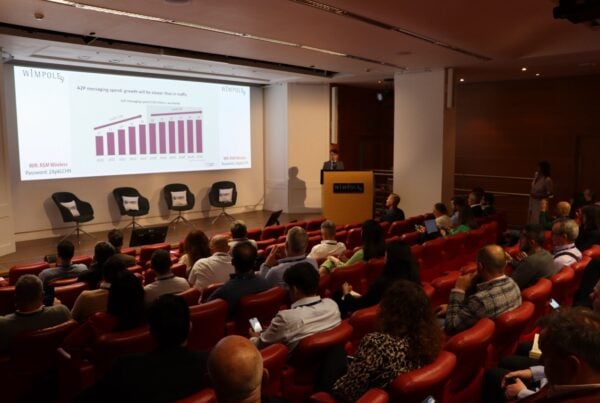This month, MEF was in Washington DC for ITW to catch up with Members attending the landmark industry event, hosting a Member Meet-up in partnership with Netnumber, as well as making an appearance at the show to discuss the state of RCS – MEF’s Mina Yazdani shares an overview.
We recently had the pleasure of attending the ITW conference last week in Washington DC, National Harbour, where our esteemed US representative, TJ Thinakaran, shared his thoughts on the panel titled “Has RCS Finally Become a Reality?” The session was enlightening, and we wanted to share some key takeaways with you.

Market Dynamics and Adoption Rates
Chuck kicked off the discussion by explaining the current dynamics of the RCS (Rich Communication Services) market. Adoption rates and readiness to embrace RCS vary significantly across different regions. In the US, for example, the market is still in a wait-and-see mode, observing developments and planning the best way forward.
Distinguishing RBM and RCS
TJ made an important distinction between RBM (Rich Business Messaging) and RCS. He highlighted that Apple’s potential adoption of RCS could be a game-changer, especially considering their recent drop in handset sales. This move could provide a much-needed boost to the RCS ecosystem.
One significant advantage of RCS highlighted during the panel is its universal nature. Regardless of the operator, brands can communicate with all users, which is particularly beneficial for early adopters of RCS development. This universal reach could solve the problem where 10-15% of SMS messages currently don’t reach their consumers.”
Realistic Expectations for Industry Progress
One of the critical points raised was the timeline for progress in the industry. Rapid advancements within a few months are unlikely. Instead, we should anticipate a more gradual development as stakeholders continue to explore and refine RCS capabilities.
The “Wow” Factor
A standout moment from the session was TJ’s paraphrased statement: “Why can’t we get the same wow as the Android brethren?” This comment encapsulated the excitement around Apple potentially joining the RCS movement, which could elevate the entire ecosystem.
Types of Messages and Pricing Models
TJ also broke down the various types of messages that RCS supports, ranging from simple texts to complex conversational messages, e-commerce interactions, travel updates, and emergency services. He discussed the implications for pricing models, questioning how costs will be structured—for example, the cost of a 24-hour conversational message.
Universal Communication for Brands
One significant advantage of RCS highlighted during the panel is its universal nature. Regardless of the operator, brands can communicate with all users, which is particularly beneficial for early adopters of RCS development. This universal reach could solve the problem where 10-15% of SMS messages currently don’t reach their consumers.
 Addressing Uncertainty in the Wholesale Market
Addressing Uncertainty in the Wholesale Market
However, there is a lot of uncertainty around RCS in the wholesale market. Carriers need to publish pricing as soon as possible to provide clarity and encourage broader adoption. The messaging contingent only grows every year, underscoring the importance of establishing clear pricing structures to support this expanding market.
Challenges and Opportunities
The discussion also touched on some challenges. For instance, how can Google push RCS when it doesn’t regularly use it itself? Moreover, Google’s reluctance to implement brand verification was exemplified by the simple example of “Joe’s Pizza down the road.” The goal, according to Google, is to level the playing field with iMessage for Android users.
Audience Interaction
An interesting question from the audience compared RCS to WhatsApp, which is free. The question probed why people would adopt RCS when they already have a free alternative. Nema responded that RCS is still developing and not yet widely known in all markets, implying there is room for growth and improvement.
The Future of RCS
Bernardo closed the session by emphasizing that a significant conversation about RCS is on the horizon. By October, TJ predicted that everyone would have a clearer understanding of the technology and its potential.
Conclusion
The panel at ITW provided valuable insights into the current state and future of RCS. While there are challenges to overcome, the potential benefits for brands and consumers alike are immense. As we look forward to further developments, it’s clear that RCS has the capability to revolutionize how we communicate.
Stay tuned for more updates as we continue to explore and embrace the evolving landscape of RCS. Let’s see how things unfold, having been my first ITW, it did not disappoint, and this was such a valuable session especially for those who want to be ahead of the curve when it comes to RCS! MEF also hosted a drinks reception supported by Netnumber the night prior and it was so great to see so many familiar and new faces. For more thought leadership opportunities and the chance to attend telcos most intimate and engaging networking meet-ups, don’t be shy to get in touch.





